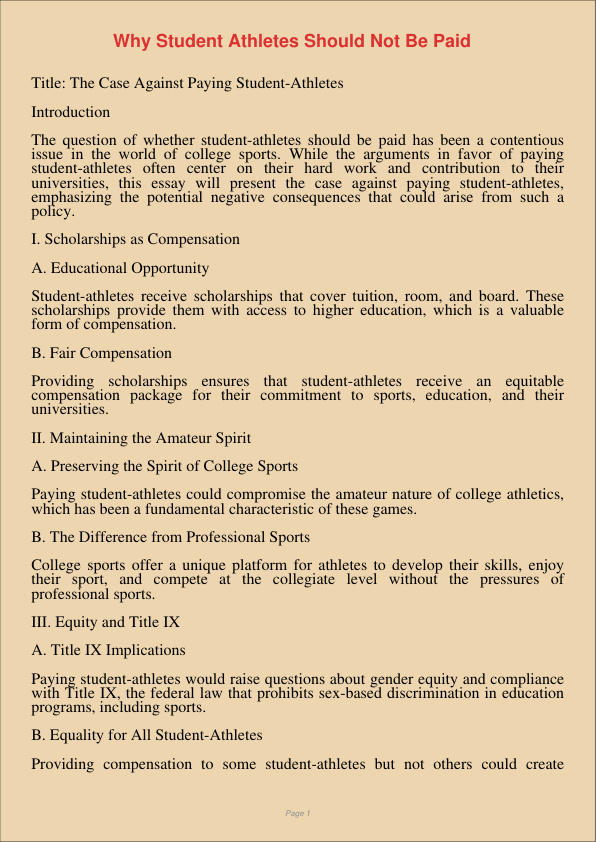Why Student Athletes Should Not Be Paid
Jan 12, 2024
student athletes
paid
Biology
Philosophy
Title: The Case Against Paying Student-Athletes
Introduction
The question of whether student-athletes should be paid has been a contentious issue in the world of college sports. While the arguments in favor of paying student-athletes often center on their hard work and contribution to their universities, this essay will present the case against paying student-athletes, emphasizing the potential negative consequences that could arise from such a policy.
I. Scholarships as Compensation
A. Educational Opportunity
Student-athletes receive scholarships that cover tuition, room, and board. These scholarships provide them with access to higher education, which is a valuable form of compensation.
B. Fair Compensation
Providing scholarships ensures that student-athletes receive an equitable compensation package for their commitment to sports, education, and their universities.
II. Maintaining the Amateur Spirit
A. Preserving the Spirit of College Sports
Paying student-athletes could compromise the amateur nature of college athletics, which has been a fundamental characteristic of these games.
B. The Difference from Professional Sports
College sports offer a unique platform for athletes to develop their skills, enjoy their sport, and compete at the collegiate level without the pressures of professional sports.
III. Equity and Title IX
A. Title IX Implications
Paying student-athletes would raise questions about gender equity and compliance with Title IX, the federal law that prohibits sex-based discrimination in education programs, including sports.
B. Equality for All Student-Athletes
Providing compensation to some student-athletes but not others could create divisions and undermine the spirit of teamwork and equality in college sports.
IV. Financial Challenges
A. Financial Burden on Universities
Many universities, especially smaller ones, struggle to fund their athletic programs. Paying student-athletes would further strain university budgets, potentially leading to program cuts or tuition increases.
B. Unpredictable Costs
The cost of paying student-athletes is unpredictable and could lead to disparities between schools with larger budgets and those with limited resources.
V. The Risk of Commercialization
A. Focus on Commercial Interests
Paying student-athletes may shift the focus of college sports towards commercial interests, compromising the educational mission of universities.
B. Professional Sports as an Alternative
Student-athletes have the opportunity to pursue professional careers, where they can earn salaries, after their college careers are completed. Paying them while in college could discourage this transition.
Conclusion
While the question of paying student-athletes is a complex and divisive one, there are valid reasons against such compensation. Scholarships already provide student-athletes with valuable compensation in the form of an education, while paying them could compromise the amateur nature of college sports and raise concerns about equity. The potential financial burdens on universities and the risk of commercialization further highlight the complexities of this issue. Rather than paying student-athletes, it may be more reasonable to focus on improving the conditions, benefits, and support systems available to student-athletes within the current framework.
